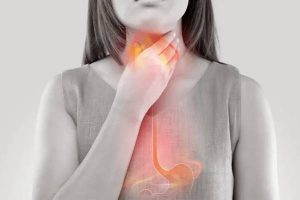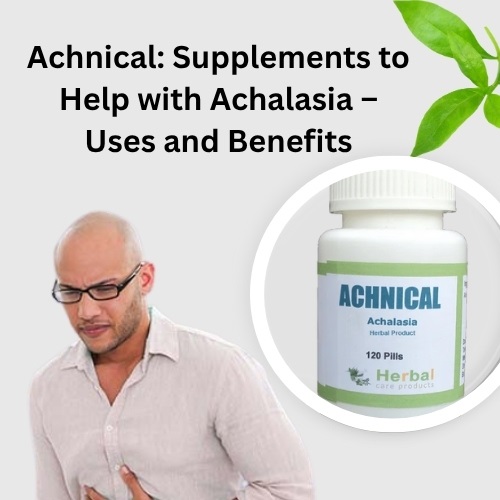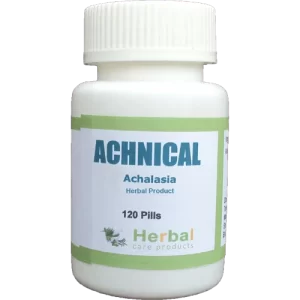Achalasia is a rare esophageal motility disorder, in which the lower esophageal sphincter (LES) fails to relax properly, impairing food passage from the throat to the stomach. This leads to symptoms like difficulty swallowing (dysphagia), chest pain, regurgitation, and weight loss. While medical treatments such as medications, endoscopic procedures (baloon dilation, Botox), and surgery (Heller myotomy, POEM) are common, there’s growing interest in complementary herbal approaches aimed at symptom relief, muscle tone support, and digestive comfort.
One such adjunctive remedy is Achnical, a herbal supplement marketed by Herbal Care Products specifically for achalasia. This article explores achalasia, current conventional and herbal therapies, and then provides an in-depth review of Achnical: its ingredients, proposed mechanisms, suggested usage, pros and cons, and real-world considerations.
1. Understanding Achalasia
1.1 What Is Achalasia?
Achalasia is a chronic condition characterized by:
- Failure of the LES to relax during swallowing
- Loss of esophageal peristalsis
- Impaired transit of solids and liquids
- Potential for esophageal dilation over time
Symptoms typically include progressive dysphagia, chest discomfort, regurgitation of undigested food, unintentional weight loss, and occasional coughing or aspiration.

1.2 Diagnosis & Conventional Management
The diagnosis of achalasia commonly involves:
- Barium swallow: “bird’s beak” narrowing
- Esophageal manometry: confirming failure of LES relaxation
- Endoscopy: ruling out tumors
Treatment aims to alleviate symptoms by reducing LES pressure. Approaches include:
- Medications: nitrates or calcium channel blockers to relax the sphincter; Botox injections for temporary relief
- Endoscopic/Surgical: balloon dilation, Heller myotomy, peroral endoscopic myotomy (POEM)
- Lifestyle and dietary changes: soft or pureed diet, small meals, staying upright after eating
While effective, Herbal Treatment for Achalasia may require repeat interventions, and surgery especially can lead to reflux, necessitating lifelong follow-up.
2. Herbal & Lifestyle Approaches to Achalasia
Though herbal supplements are not a cure, many patients turn to them for supportive relief:
2.1 Common Herbs & Remedies
Herbal Care Products and other alternative Supplements sources highlight several potentially supportive herbs:
- Slippery Elm: Coats and soothes the esophagus
- Licorice Root, Chamomile, Ginger: Anti-inflammatory and muscle-relaxing
- Barley Grass: Alkaline, anti-inflammatory, may ease digestion
- Pickle Juice / Apple Cider Vinegar: Anecdotal relief through acidity and muscle stimulation, though evidence is limited
- Pica Prunella, Rhizoma Sparganii, Magnolia Bark (Cortex Magnolia Officinalis): Traditional Chinese herbs said to aid muscle relaxation and circulation
2.2 Lifestyle Strategies
In addition to herbs, lifestyle changes recommended include:
- Eating slowly, chewing thoroughly
- Choosing soft, pureed, or blended foods
- Avoiding hard-to-swallow food and staying upright after meals
- Drinking hot water therapy to relax the esophagus
3. What is Achnical?
Achnical is promoted as a natural herbal supplement for achalasia specifically for managing achalasia and associated swallowing difficulties (dysphagia and dyspepsia). Marketed in 120- and 240-tablet packs, its ingredients—such as Arillus Myristicae (nutmeg), Elephant Creeper, Saffron, and Serpentine—are intended to:
Key claims include:
- Acts on esophageal smooth muscles
- Improves LES tone and muscle coordination
- Helps with dysphagia and digestive discomfort
- Contains natural, Greek-system herbal ingredients with no side effects claimed
It’s presented as a 100% natural, Greek-inspired herbal blend, backed by a money-back guarantee and “clinically verified”. Per the product description, daily use—2 tablets post-breakfast with water or lukewarm milk—is recommended. Users are cautioned against taking it with cold drinks, skipping breakfast, or deviating from the dosage instructions.
4. Achnical’s Ingredients & Purported Effects
Achnical’s listed ingredients are:
| Ingredient | Traditional Use & Potential Effect |
| Arillus Myristicae | Possibly derived from nutmeg; may offer digestive support |
| Elephant Creeper | Traditionally anti-inflammatory |
| Nutmeg | Used to soothe digestion; mild spasmolytic |
| Saffron | Anti-inflammatory, antioxidant |
| Serpentine | Ambiguous; perhaps refers to plant used in muscle relaxation |
These herbs may individually provide muscle relaxation, anti-inflammatory effects, or digestive support. However, scientific data specific to achalasia is lacking.
5. Suggested Directions & Safety
According to product guidelines, users should take two tablets of Achnical daily after breakfast, with room-temp water or warm milk, avoiding cold drinks. The product also includes a money-back guarantee emphasizing natural composition.
Potential side effects and considerations:
- Ingredients like nutmeg and saffron are generally safe in moderate amounts, but can cause issues at high doses (e.g., nutmeg toxicity)
- Interactions with medications are possible; consulting a physician is essential—especially for those on blood thinners, antidepressants, or antihypertensives
- Safety during pregnancy/lactation or in elders must be assessed individually
6. Uses & Advantages
Symptom Relief
Achnical aims to alleviate primary achalasia symptoms:
- Easing swallowing of solids, liquids, and saliva
- Reducing throat soreness, heartburn, chest pain
- Improving digestion and appetite
Customer testimonials suggest it may help with dysphagia and muscle soreness.
Ease of Use and Natural Profile
- Simple regimen: 2 tablets daily after breakfast
- No refrigeration needed; herbal blend is based on traditions
- Larger bottle sizes available for extended use
7. Pros & Potential Benefits
👍 Advantages of Achnical include:
- Holistic support: Targets muscle tone, digestion, and inflammation
- All-natural formula: Appeals to those seeking herbal, side-effect‑free options
- Convenient daily dosing: Easy to integrate with medical treatment
- Refund policy: Offers risk mitigation with money-back guarantee
Potential therapeutic effects:
- Improved muscle relaxation may facilitate swallowing
- Anti-inflammatory herbs may reduce esophageal irritation or spasms
- Possible acid suppression and digestive ease
8. Integrating Achnical into Achalasia Management
A balanced approach combines:
- Medical therapy – doctors may prescribe smooth‑muscle relaxants or proceed with dilation/surgery
- Supportive diets and lifestyle – small meals, soft textures, upright posture
- Herbal supplements – taking Achnical as part of a broader regimen
- Regular follow‑up – monitoring symptoms via manometry, endoscopy, or imaging
Achnical should be viewed not as a primary treatment, but as a potential adjunct to medical care.
9. Final Assessment & Recommendations
Achnical is a thoughtfully constructed herbal supplement combining traditional botanicals aimed at improving esophageal function. Its surprising benefits and natural profile may appeal to those interested in complementary therapy. Key considerations include:
- ✅ Use alongside, not instead of, medical treatments
- ✅ Consult healthcare providers, especially if on medication or with chronic illnesses
- ✅ Monitor symptoms closely and supplement only if helpful and well-tolerated
- ✅ Continue standard care – maintain follow-ups, testing, and possible surgical/endoscopic interventions
Conclusion
Achnical offers a botanical approach that may ease symptoms and bolster digestion in achalasia. However, since it lacks robust clinical studies, it should be used judiciously, in coordination with gastroenterologists. Combining conventional care, dietary measures, and selected herbal supplements like Achnical may offer a holistic strategy for managing this challenging condition.





